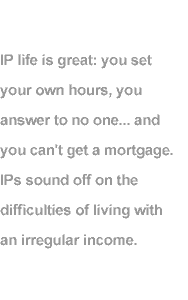|
Newsflash: Landlords Don't Trust IPs, Either
In competitive real estate markets such as New York City, professionals who work on a freelance basis can be turned down in favor of applicants with regular paychecks. IPs who do make it past the tough big-city apartment screening process usually have to show their bank statements to prove that they've got the money in their savings accounts to cover a full year's worth of rent. Paying rent several months in advance is also not unheard of when landlords are doubtful about the regularity of an IP's income. Landlords in certain areas of the country -- those with large student populations, for example -- tend to be more flexible than others when it comes to renting housing to people who don't have "normal" jobs.
|
|
|
Despite his impressive income, Bellingham says he has still faced enormous suspicion from banks when applying for loans. He isn't surprised, either. "The banks are right to worry," he says. "It's true: the nature of my work as an independent consultant means that there is no security to my income."
For example, when Bellingham applied for a mortgage, he was stunned by the need for so much documentation. "I had to provide five years' worth of 1040s," he says. A person receiving a regular salary from a company would have had to show W-2 statements from the previous two years. Additionally, he was required to show his company's income statement and profits from the year-to-date. "There's ten times more scrutiny on me because I work for myself."
"The truth is, it was all very pleasant and professional, " says Bellingham. "But I was taken aback and confused by the need for so much documentation. Then I had to scramble to collect my records, and I'm not very good at doing that. It was just a hassle for me."
He adds, "Someone just starting out as an IP, someone who can't provide proof of their earnings for a significant period of time, could have big trouble trying to get a mortgage. Eighty percent of new businesses fail, so why would banks bet on that?"
A home loan officer at Iowa State Bank & Trust Company in Iowa City explains that the bank looks very carefully at tax returns for evidence of net income when considering mortgage and other loan applications from people who are self-employed.
Because some IPs "expense" almost everything in an effort to reduce their taxes, their net income can appear small to the bank. Working for yourself means that you can deduct most everything that you buy or rent in order to get your jobs done. Leased cars, computer equipment, rent for your office, gas for your car, and your dry-cleaning bills, for example, are all expenses that can be deducted from the money that you show you've earned on your 1099 statements. This reduces your taxes, but it also -- on paper, at least -- reduces your net income.
|
 Leased cars, computer equipment, rent for your office, gas for your car, and your dry-cleaning bills, are all expenses that can be deducted from the money that you show you've earned on your 1099 statements.
Leased cars, computer equipment, rent for your office, gas for your car, and your dry-cleaning bills, are all expenses that can be deducted from the money that you show you've earned on your 1099 statements. |
|
One thing an IP can almost never get is a large, unsecured line of credit for running his or her business, says Bellingham. "Even now, after 18 years, I couldn't get that -- not unless the credit line were secured by collateral, such as my house." For IPs trying to grow their own businesses, "It is very difficult to get start-up capital," says Bellingham. "You've got to put yourself on the line. You almost have to sell your soul."
Bellingham explains that he was interested in obtaining a business credit line of about $100,000 in order to market his business and have some left over to cushion the ups and downs of his business. But because Bellingham is his business, he would be personally liable for such a loan; he wouldn't have a corporate shield to protect him in the event that he was unable to pay it back.
How Staples Holds it Together
Some IPs are worse off than others in terms of securing the faith of lenders and creditors. The term "starving artist" is familiar in the lexicon of labor, and rightly so. Many artists only get paid for their work a few times a year -- after finishing commissioned work, or after a successful art show, for instance. In order to give themselves financial credibility, therefore, many artists take on additional full- or part-time work.
"You have to find some sort of stable economy for yourself, some income you can count on," says Mary Anne Staples, a watercolor artist in Pensacola, Fla. She supplements her income by offering art classes at her home to children ranging in age from 6 to 18 -- and she's been doing this for more than 20 years.
Unfortunately, even her teaching income isn't as steady as she'd like. "This week no one showed up at my house for class," she said, explaining that she can get anywhere from 10 to 15 children per class -- or none at all. "You have to be optimistic and flexible."
Staples admits, "Being in the arts, it is very hard to borrow money. Art is only considered to be as good as what it can get sold for, and because this is so variable and so personal, it is especially hard for banks to take you seriously. I would have a very hard time buying a car, for example. I probably wouldn't be able to get financing on a new car if I weren't applying for it with my husband, Tom, an attorney."
Staples also knows that when she has a windfall -- after a show with a good turnout and high sales -- she can't just spend it all. Instead, she must put money aside for leaner times. "But you don't mind the discipline that working for yourself requires when you enjoy what you do," she adds.
Keeping the Banks at Bay
Have these stories made you depressed? Reminded you of your own money woes? Made you think about packing it in? Well, don't. We found someone who knows a thing or two about IP income problems -- and he's got some advice for you.
Kieran Collins is now an independent hiring consultant, but in his former wage-slave incarnation as a human resources director, he occasionally vouched for the IPs his company hired. He explains, "I have had to answer to banks for these IPs and explain how long their contracts were good for, and what we were paying them -- just to help them get a loan or a mortgage. But that's not always a guarantee that the IP's loan would be approved. Bank officers, if they word their questions right, can get us to admit that there is no real guarantee that the IP's assignment won't end prematurely."
So how can an IP keep the banks at bay?
Collins advises you to buy a house or go for a big loan while your cash stream is constant -- before you become an IP. Otherwise, you might, like Rick Bellingham, encounter some hassles in the application process.
Which is swell advice, if you're a well-paid employee looking to run away from the corporate circus. But what happens if you've already left your job, if you are living right now with an irregular income?
Collins suggests that IPs secure a contract from the company they're consulting for -- preferably a contract that outlines how much money the IP will get if the assignment ends sooner than planned. Having such a contract "is even better than being a regular employee," Collins explains: W-2 employees rarely get guarantees. Get the contract, and take it to the bank.
Of course, a contract might not convince every bank officer that you're as financially solid as a corporate citizen, but it may go a long way in easing their fear of an unsteady income.
No Easy Way to be Free
Like all good IPs, Collins, Staples, and Bellingham have learned to accept the ups and downs of the freelance life. You should, too. If you can't learn to live with an irregular income, you'd probably be happier as a wage-slave. No one ever said being an IP would be easy. Like everything else, freedom has its price.
|



